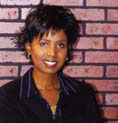| Solving the college mystery | Entrepreneurs extraordinaire | Ivy League Maverick |
| Home Forethought Campus Buzz Feature Stories Re:Search The Score Alum News Yesteryear | ||
 Jill Darden recently stood face-to-face with one of America’s most recognized celebrities. The 1996 broadcast journalism graduate interviewed Oprah Winfrey in May for her weekly news program, The Urban Voice, on the Urban America Television Network. Darden hosted the 30-minute show from January 2004 to July 2005. She is also founder and publisher of Fort Worth Black News, a 10,000-circulation monthly community newspaper. She has received numerous awards for her newspaper work, including the Texas Legislative Black Caucus Outstanding Texan Award for Public and Community Service in 2003.
Jill Darden recently stood face-to-face with one of America’s most recognized celebrities. The 1996 broadcast journalism graduate interviewed Oprah Winfrey in May for her weekly news program, The Urban Voice, on the Urban America Television Network. Darden hosted the 30-minute show from January 2004 to July 2005. She is also founder and publisher of Fort Worth Black News, a 10,000-circulation monthly community newspaper. She has received numerous awards for her newspaper work, including the Texas Legislative Black Caucus Outstanding Texan Award for Public and Community Service in 2003.
What was it like interviewing Oprah?
It was a dream come true. I have always admired her work as a broadcaster and her humanity. Her life’s story of survival, overcoming the odds and giving back has inspired millions. In many ways, Oprah revolutionized the way American women see themselves, and she has provided information that enables us to live our best lives. When she walked through the door on the day of the interview, tears welled up in my eyes, but I quickly suppressed them. I didn’t want to look like I didn’t belong or cause Oprah to second-guess her decision to grant the interview. Since I began to work in broadcasting, I’ve wanted to meet Oprah. I just didn’t know it would happen this soon.
How did The Urban Voice come about?
It was a joint venture between UATV and my newspaper. When the network moved its headquarters to the Dallas/Fort Worth area, it wanted to create more locally produced programs. Former Fort Worth City Councilman Frank Moss and his son, Edmund, made me aware of the need and set up the initial meeting. Prior to producing The Urban Voice, I had developed a show for Fort Worth cable TV that aired for five years.
What about the Fort Worth Black News?
The newspaper business got in my blood as a child when my mother founded and published the Wichita Falls Black News from 1983 to 1985. I remember staying up until 3 o’clock in the morning with her to finish laying out the pages. At the age of 10, I was selling those newspapers door to door for 35 cents each. My mom let us keep a dime from each sale. I had so many shiny coins at the end of the day, and I felt so very rich. I loved the business—meeting the people, providing information and making a profit. The same fulfillment I felt at 10, I feel today when it comes to the business of news. I started the Fort Worth Black News eight years ago, shortly after graduating from UT Arlington. At the time, I wasn’t pleased with any of the hometown minority papers; it seemed like they were taking African American readers for granted. So, with the help of my mother, I created the type of community publication I enjoy reading.
Other than Oprah, what are the top interviews you’ve done?
I’ve interviewed some wonderful people, from celebrities to ordinary people doing extraordinary things. Some names you might recognize are Earl Graves, publisher of Black Enterprise magazine; Smokey Robinson, Johnnie Cochran, Judge Greg Mathis, Erykah Badu, Jaqueline Jackson, Stedman Graham and Dennis Kimbro.
What things did you do as a student that helped prepare you for a career?
The UT Arlington experience helped to make me a well-rounded person. Being involved in extracurricular activities on campus sharpened leadership skills, decision-making ability and understanding of different cultures. I served as president of my sorority, Zeta Phi Beta, and president of EX.C.E.L., and I was elected Miss UTA. In terms of technical skills, the internship I had at Irving Community Television proved invaluable.
What professors or staff members influenced your career?
So many! Where do I start? The first people who come to mind are Mardie Sorensen and Susan English. These two ladies worked directly with us in the Student Activities Department. They had so much to do with leadership training and development outside the classroom. I still use some of the things I learned there, like contract writing and event planning. Dr. Kent Gardner’s leadership class introduced me to a different level of thinking. Zeb Strong and Richard Massie helped minority students feel comfortable with the University’s Office of Multicultural Services. Academically, Dr. Karin McCallum introduced me to the fundamental definition of communication, upon which good writing and speaking are built. “Communication is message sent, message received,” she said. “If there’s a problem in the transmission, you’re not communicating effectively.”
What’s next?
My immediate goals include expanding the publishing business to include books and producing television specials to air in the Dallas/Fort Worth area. That’s enough for me to handle at this time. But as Oprah said in her interview, “God can dream a bigger dream for us than we can dream for ourselves.” So we’ll see what happens.
— Jim Patterson
| Archives
| Alumni Association |
Giving to UTA | UTA
Home Copyright © 2005 UTA Magazine. All rights reserved. |
